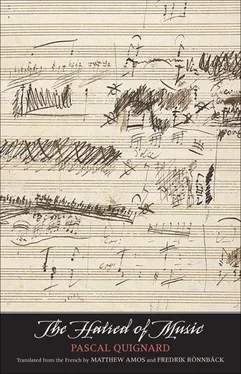Nothing, nothing moves any longer.
I no longer hear even the breath that animates me. The wind no longer exists. The vast bamboo grove shakes more than it trembles. In front of it, the broom cracks its black and dry husks, abruptly dropping its seeds on the short, yellow grass. Nothing human has ever mattered to this world. Nothing human has ever excited the interest of rivers or flowers. Everything fades away in the specks of this blurred haze that the fire of the sun has added to the heat of the light. The midday sun begins to decline. The river of the dead itself has fallen asleep. Nothing human has ever mattered to the water that stagnates and no longer refreshes. Nothing human has ever mattered to the dreams that visit the sleep of men. Nothing human has ever mattered to the visions that dazzle them under their closed eyelids and that violently erect their sex while they watch them, ignore them, and sleep.
Tenth Treatise. ON THE END OF THE LIAISONS
The Vicomte de Valmont looks at the green grass of the meadow at Saint-Mandé. His shirtsleeve has been torn by iron: he was struck in the arm by a sword. Silently, he turns his back on the Chevalier Danceny’s corpse. He steps into his coach.

The Vicomte violently draws back the curtains of the bed to which the Présidente de Tourvel is confined. Her forehead is covered in sweat while her lips let out a death rattle in the silence of the room. He shouts an order, raises her chest, very delicately tears the satin negligee tightened around the Présidente’s neck. Madame de Tourvel’s naked limbs, white and thin in the faint light of the candelabrum, unsettle him. He has her drink a large glass of Colmar pear brandy. She regains consciousness, sees him, grabs hold of him while saying his name, embraces him. As she embraces him, he takes her. Taken, she lives again. They return the following day, in the thick fog of dawn and the piercing cold, to Paris. Valmont becomes a formidable financier. The Présidente de Tourvel organizes his soirées. She relieves his nights.

In the deepest silence, the Chevalier Danceny’s body, picked up by witnesses in the meadow at Saint-Mandé, is placed on a stretcher. They transport him with great caution to a surgeon in Vincennes. The surgeon saves him. Six months later, Danceny is admitted into the Loge des Neuf-Soeurs, where he becomes friends with the Prince de Rohan, the American Benjamin Franklin, the painter Greuze, Doctor Guillotin, Danton, and Hubert Robert. During the Revolution, he votes for the death of the king and persuades the Constituent Assembly to have all the statues of the past destroyed, breaking “all genital parts of every man, despicable vestiges of the Ancien Régime.”

On the right bank of the Seine, at the Opera, Madame de Merteuil greets the Vicomte and the Présidente with a smile and passes by them without breathing a word: the lover of the moment raises the portiere above her. Madame de Merteuil escaped smallpox, and her face remained unscathed. Not only did she win her trial, but the court granted her a sum fixed at eighteen thousand pounds. She remains in Paris despite the impression given by her letters. The Marquise’s reputation, having been tarnished, captivates. In society, at the theater, men surround her, to the point where her daily life becomes nearly impossible. She decides to travel, a solitary voyage, embarks at Le Havre de Grâce, crosses the English Channel, rides through the Hampshire countryside in a berline. Suddenly in the clouds, the hubbub and the jolts, she signals to the driver to stop and acquires there, in the town of Deane, a small, twenty-room house. A long and sinuous, gray gravel drive leads up to it. Behind the house, a large pond in the middle of a meadow, bordered by a small wooded area.
On the horizon, low hills are barely distinguishable through the mist. The air is humid and blue.
Everything is silent.

Every afternoon, Madame de Merteuil visits her paupers. She notices two of them, Cassandra and Jane, who live at the edge of town, in the small rectory of Steventon, and with whom she enjoys singing the melodies of Jackson of Exeter. The Marquise learns the bass viol with a former Royal Company bowman. She invites her young friends over for short Handel or Caix d’Hervelois trios that are interrupted by outbreaks of uncontrollable laughter. Jane offers the Marquise an old piece by Purcell, in a similar genre, wrapped in a pearl gray ribbon, a piece of music that astounds the Marquise in spite of its antiquity. Cassandra is on the flute, Jane on the harpsichord, while the Marquise provides the bass and taps out the measure with her foot: they sight-read the entirety of the old manuscript. After the sight-reading, it is quite late; they drink wine, talk nonsense; the Marquise pushes them to be silly, but the Austen girls are reluctant. Suddenly the cock crows and Jane stands up, pale as a sheet. She takes her sister by the hand and the two of them rush off to the rectory, holding up their skirts. The Marquise buys for Jane, in the hope of corrupting her, for the study room at Steventon, where the pig used to sleep a hundred years earlier, a real piano, for the price of forty guineas. The Marquise does not care for its sound, which is imprecise and therefore unsteady and sentimental, but Jane is madly happy. The Marquise acquires and attempts to play on her viol all the works that remain under the name Henry Purcell and that she has had someone search for in London; she takes up singing in order to sing them, but the two young girls no longer want to help her play a music that seems too pompous to them. No matter: the Marquise takes to cricket. From then on she dresses in riding habits and complains about the discomfort of the frilly skirts coming into fashion. On Jane’s advice, she gushes over Crabbe’s poetry. She goes walking more and more often in the woods that border the property and that is cut through by a stream, whose water is directed to the pond by means of a thin and frail aqueduct that elms hide from view. Among her peasants are three or four cricket players whom she summons when sexual desire suddenly begins to burn under her belly. She has them masked with animal masks to see in them nothing but life, or at least one of its semblances which seems to her the sincerest and most touching. She tires of young people. The young girls’ conversation has become equally tedious, and their intransigent disdain for Purcell’s work disappoints her more and more every day, as it was they who introduced her to it. Despite Jane’s barbs, never for a moment does it seem to the Marquise that she grows old in being moved by these two hundred — year — old sounds. She makes ready to leave Hampshire.
She begins to have certain whims with age, which, however, in the town of Deane, are not considered shocking: she would have liked to be a kangaroo. She is of the opinion that Greenland does not exist. At the same time, she claims that neither does God. She is completely certain that men can fly. She is convinced that the strongest odors are in the process of disappearing from this world. She affirms that in the spring she would love to be a little midge in front of the flowers. She declares that she loves the energy in the gaze of women, in the gaze of the youngest of her two musician friends, in the gaze of a man she once knew, in the gaze of dogs, in the gaze of barn owls who devour the red squirrels that abound in Hampshire. She prefers to anything else, even pleasure, the shadow, in July, of chestnut trees. She begins to like pulling chaises longues over the grass. She also likes plates of crushed strawberries, the E major scale, the sound of the bass viol when separated from its source by a closed window, the beauty of water, the beauty of the sound of water and the beauty of its reflection of nature, which is broken by a falling leaf, or by throwing a small stone, and which calm and the following instant quietly restore.
Читать дальше













